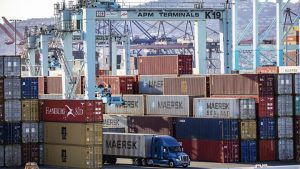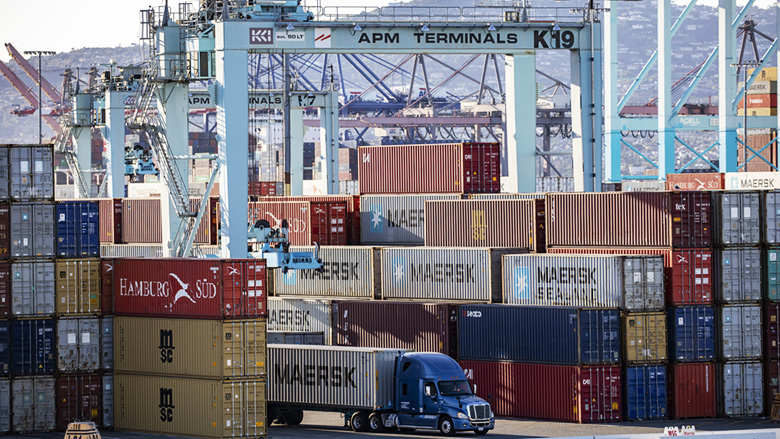
Do demurrage and detention (D&D) fees help or hinder efforts to untangle the supply chain at America’s seaports?
D&D fees are assessed by MTOs—marine terminal operators and “common carriers,” meaning vessel operating common carriers (VOCCs) and non-vessel operating common carriers. (NVOCCs). The fees have a straightforward intent: pick up and return your stuff on time or you will pay extra, a notion that most people support.
To distinguish: Demurrage is charged daily by the shipping line from the date of discharge until the container is moved out of the port, while detention is charged per day per container by a port, from exit time until the empty container is returned.
Those who assess the fees acknowledge some problems, but defend the system as changes could have impacts reaching all the way to national security.
On the other hand, those who have to pay contend that D&D assessments are unfair, costly and de-linked from basic concepts about timeliness.
The Federal Maritime Commission (FMC) has become very interested in D&D dynamics and equity. Last July, FMC Commissioner Rebecca Dye recommended asking industry “whether the commission should require common carriers and marine terminal operators to include certain minimum information on or with demurrage and detention billings and adhere to certain practices regarding the timing of demurrage and detention billings.”
Dye expressed concern that D&D billings are confusing and that shippers find “what is being billed by whom” unclear. Additionally, the FMC had concerns that MTOs and carriers were taking advantage of port tie-ups to assess D&D fees even when it was impossible for operators to make correct and timely moves which would have allowed them to avoid the fees.
On Feb. 15, the commission published an “Advance Notice of Proposed Rulemaking” to investigate various D&D issues. The notice presents a series of questions regarding the extent, or scope, of a possible new D&D ruling, e.g., should it cover MTOs and VOCCs and NVOCCs?
The panel also asks about inaccuracies, payment deadlines and dispute resolution and how a new regulation might fit or conflict with other policies, particularly the UIIA—the “Uniform Intermodal Interchange and Facilities Access Agreement.” That’s an industry standard for the interchange of equipment between intermodal trucking companies and equipment providers, i.e. ocean carriers, railroads & equipment leasing companies.
Importantly, UIIA is not a government standard. The agreement is overseen by a membership trade group—the Intermodal Association of North America (IANA). Ninety-five percent of North American equipment interchanges are managed under the UIIA, and 10,000 intermodal trucking companies participate, according to IANA.
Twenty-four individuals, companies and trade groups had responded to the FMC’s initial request for comments, and that number will likely increase. In early March, the commission received a letter on behalf of 44 industry groups—from the Harbor Trucking Association to the North American Meat Institute—asking for an extension of the comment period; it was granted on March 11. These trade groups were “in the process of surveying respective member companies to gather their experiences and document them in a manner that is most helpful to the FMC.”
The comments in the commission’s docket more or less break out into three broad business categories: port customers, NVOCCs and MTOs. Each has different perspectives and varying concerns. A fourth category was missing—VOCCs, at least among the initial commenters. This is worth noting since VOCCs are critical players. One person familiar with these issues said, on background, that VOCCs are holding back, watching how developments proceed before making a move—or not—to enter the fray.
The following summarizes some of the issues highlighted by impacted businesses.
Port Customers
Potential Industries, Inc., is a recycler located within the San Pedro Ports and uses both Los Angeles and Long Beach. A company executive, Daniel Domonoske, writes that it is unfair when cargo may be ready, but there are no appointment times for pick up, yet demurrage charges start to accrue anyway. Or a trucker is waiting but there are no chassis. Domonoske calls detention rates “onerous and punitive, with no relation to actual cost.” He said rates can be up to $160 a day.
MaryAnn Teague, logistics supervisor for The Meadows Group, LLC, a chemical distributor, notes that while D&D fees “are intended to incentivize the fast movement of containers through ports they have failed.” In 2021 the Meadows Group was charged 300% more in D&D fees than in prior years. Teague “strongly recommends” that both MTOs and carriers are included in any new D&D billing regulations. “Every link in this process needs to be accountable,” she writes, “in order to improve the administration of these charges.” She estimates that roughly 30% of D&D bills contain inaccurate information.
Jean-Luc Carriere, is with North America for CellMark, which operates mostly in L.A. and Long Beach. CellMark is challenging “tens of thousands” of dollars in demurrage. He calls the process to return containers “an indecent trap” and adds: “If you want to dispute something you better have time, patience (and) proof beyond reason as you are guilty until you can prove your innocence.”
NVOCCs
MODE Transportation is a freight broker and a non-vessel operating common carrier, one of the entities under the FMC’s new scrutiny.
Sharon Johnson is MODE’s Chief Legal Officer. Her comments seek to establish a distinction between her firm as compared to VOCCs and MTOs.
She writes that D&D charges originate with marine terminal operators and VOCCs. Because of that, brokers can only be reactive to D&D problems, not out front in fixing them.
Fees are assessed by VOCCs and MTOs, she explains, and then passed on to parties like MODE which, in turn, bill their customers. If billing is not timely for the NVOCC, that delay impacts transactions among all subsequent parties.
Johnson writes that “it is common for MODE to receive (D&D) invoices weeks and even months after the release and return of containers. It is not uncommon for us to never even get an invoice on a specific D&D issue, only seeing it weeks/months later when it shows up on a statement.”
Johnson offers a rough estimate that 25-30% of D&D bills contain inaccurate information. She adds, though, that the assessment is for today’s “unprecedented times.” In more normal times, she thinks the number is likely lower.
She recommends including MTOs and VOCCs in new regulations. D&D invoices, she says, should be issued within 30 days. In a closing statement she comments that without commission action, VOCCs and MTOs will evade responsibility, retain procedural difficulties and “otherwise act as oligopolies.”
Marine Terminal Operators
The National Association of Waterfront Employers (NAWE) is a non-profit trade association whose member companies are privately-owned stevedores, marine terminal operators (“MTOs”), and other U.S. waterfront related employers. NAWE’s member companies engage in business at major U.S. ports on the Atlantic and Pacific coasts, the Gulf of Mexico, the Great Lakes and Puerto Rico.
The waterfront employers association frames the issues quite differently from port customers or a NVOCC like MODE. NAWE is concerned that D&D policy changes that are too prescriptive, that take a “one size fits all approach” will “inevitably disrupt existing commercial relationships and could impact the competitiveness of MTOs that continue to face competition from neighboring foreign ports.” (Those competitive ports are not mentioned.)
NAWE writes that new D&D billing requirements would have an extensive impact, cascading all through MTO contracts with truckers, rail ramps, chassis providers, while affecting payments and reimbursement. New proposals would impact and conflict with MTO’s rights and obligations under contracts with ocean carriers and that new regs could mandate that MTOs assess charges “against entities with which it has no contractual privity or legal authority to charge.”
The waterfront employers association advises the FMC to “be mindful” of MTOs’ rights and obligations in the supply chain and among disparate contractual relationships. It writes that new regs need to “be narrowly tailored to achieve (the) purpose of promoting access to useful and appropriate information, as well as reducing disputes.”
NAWE suggests that the commission establish new advisory committees, for more study of D&D issues. It suggests that commissioners also “engage” with the FMC’s National Shipper Advisory Committee on warehouse investment and steps that committee members are taking to reduce dwell times.
The organization also raises concerns about port security arising from D&D reform, questioning whether the FMC’s request for additional information, particularly about dwell times, presents risks to proprietary information while also creating “national security risks to the supply chain.” In closing, waterfront employers association asks the panel “to consider these national security aspects and to coordinate with stakeholders and the U.S. Coast Guard, Transportation Security Administration and Cybersecurity & Infrastructure Security Agency to ensure that these risks are given appropriate consideration in the Commission’s rulemaking and to further ensure consistency with, inter alia, the Maritime Transportation Security Act of 2002, 46 USC § 70101 et seq.”
Problems?
A brief comparison of some of NAWE’s and MODE’s comments shows significant differences among supply chain participants. Consider these examples:
- Regarding the FMC’s question about inaccurate information, MODE’s estimate for today’s conditions, is that 25-30% of D&D bills are inaccurate. NAWE writes: “there are very few—if any—instances” alleging that MTO demurrage charge information was disputed as inaccurate.
- The commission asks whether MTOs should bill demurrage directly to shippers. MODE answers, yes, to limit unnecessary layers of additional billing. NAWE argues no and prefers avoiding mandates to bill parties with whom an MTO may have no “contractual privity.” The organization adds that such simplicity does not reflect the realities of a complex system and process.
- The FMC asks about a deadline for sending D&D invoices. MODE said 30 days. NAWE said no, that “this does not require further regulation with regard to MTO charges.”
IANA has offered its own insights into questions of errors within D&D billing—deeming them not a big deal. Since 2008, 985 cases were submitted for UIIA arbitration, mostly involving per diem detention charges. Of those, 660 were deemed appropriate for UIIA’s dispute resolution process.
Regarding possible new D&D regs, IANA seeks continued consistency with the UIIA. This will “minimize disruption” among practices “that most stakeholders in the intermodal industry have had in place for decades.” And trying to change the UIIA could create commercial confusion.
“Any divergence from the existing UIIA practices will likely create unnecessary business disruption that impedes rather than promotes the growth of efficient intermodal freight transportation,” IANA wrote.
The FMC’s extended comment period closed April 17. The commission has not set deadlines for completion of the review. An official said the process will move forward as expediently as thorough review and thoughtful decision-making allow.
Tom Ewing is a freelance writer specializing in energy, environmental and related regulatory issues.

